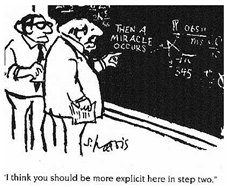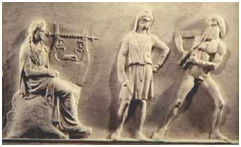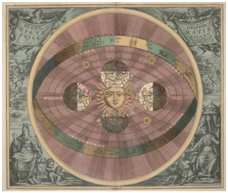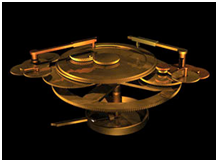Science and Math
"All men by nature desire to know." - Aristotle
The Ancient Greeks viewed science and math, and indeed philosophy as one discipline. They gave themselves the freedom to think new thoughts, focus on reason and inquiry and, above all, consider practical ideas. Their discoveries form the basis of today's foremost science and mathematical studies and, interestingly, tell us much about music. From Pythagoras, to Aristotle, to Archimedes, to Hippocrates . . . the legacy of the Ancient Greek scientists is incalculable.
The Ancient Greeks viewed science and math, and indeed philosophy as one discipline. They gave themselves the freedom to think new thoughts, focus on reason and inquiry and, above all, consider practical ideas. Their discoveries form the basis of today's foremost science and mathematical studies and, interestingly, tell us much about music. From Pythagoras, to Aristotle, to Archimedes, to Hippocrates . . . the legacy of the Ancient Greek scientists is incalculable.
Ancient Greek mathematicians contributed many important developments to the field of mathematics, including the basic rules of geometry, the idea of formal mathematical proof, discoveries in number theory, mathematical analysis, applied mathematics, and they began to formulate calculus. The discoveries of several Greek mathematicians, including Pythagoras, Euclid, and Archimedes, are still used in mathematical teaching today. They believed that Numbers was the Organising Principle of the Universe - Math is all around us!
It was the Ancient Greeks who discovered that math is an integral part of music.
The first scientist-philosopher, Thales, studied the Natural World and a paradoxical shift in thinking began ... it is Nature and not the Gods who control the World (previously they believed an angry Zeus sent out lightning bolts or an irate Poseidon created the storms at sea).
The Greeks developed astronomy. The first geometrical 3-D models to explain the motion of the planets were developed in the 4th century BCE by Eudoxus of Cnidus and Callippus of Cyzicus. Later, Heraclides Ponticus proposed that the Earth rotates around its axis. In the 3rd century BCE Aristarchus of Samos was the first to suggest a heliocentric system. Eratosthenes estimated the circumference of the Earth with remarkable accuracy. In the 2nd century BCE. Hipparchus of Nicea made a number of contributions, including the first measurement of precession and the compilation of the first star catalogue.
The Antikythera mechanism, a device for calculating the movements of planets, dates from about 80 BCE, and was the first ancestor of the astronomical computer.
The Antikythera mechanism, a device for calculating the movements of planets, dates from about 80 BCE, and was the first ancestor of the astronomical computer.
The ancient Greeks also made important discoveries in the medical field. Hippocrates was a physician of the Classical period, and is referred to as the "father of medicine" in recognition of his lasting contributions to the field as the founder of the Hippocratic School of medicine. This intellectual school revolutionized medicine, establishing it as a discipline distinct from other fields.





